Medication Error in Australian Healthcare System: Evidence-based Interventions to Reduce Risks
Added on 2022-11-12
25 Pages4697 Words369 Views
Running head: NURSING
NURSING
Name of the Student:
Name of the University:
Author Note:
NURSING
Name of the Student:
Name of the University:
Author Note:
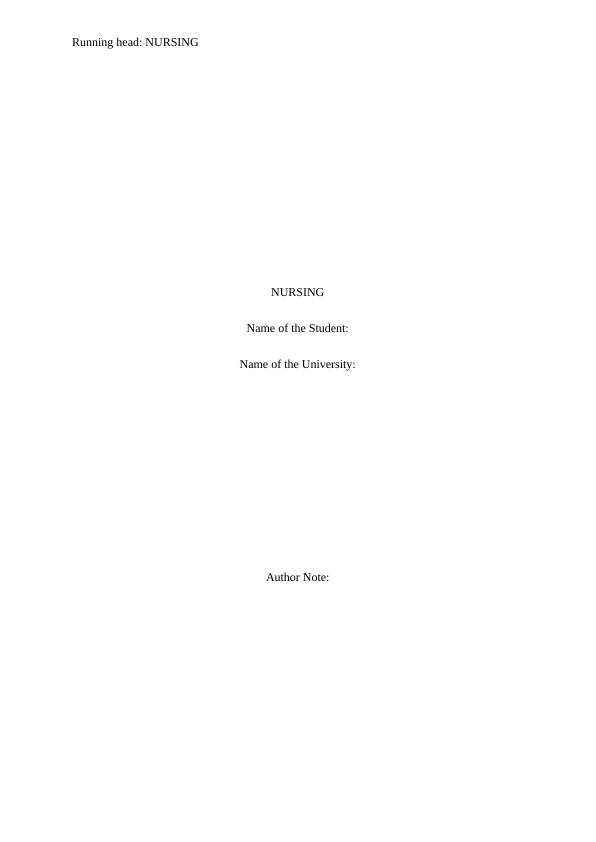
NURSING1
Table of Contents
Part 1:.........................................................................................................................................2
Identification of a clinical issue:............................................................................................2
Summarising the evidence base:............................................................................................2
Justification for the choice of topic:.......................................................................................2
Research Question:.................................................................................................................3
Search Strategy:.....................................................................................................................3
Hierarchy of evidence:...........................................................................................................4
Rationale for choice of paper:................................................................................................4
Part 2:.........................................................................................................................................5
Synthesis of findings:.............................................................................................................5
Identification of highest level of evidence:............................................................................7
Critical appraisal tool:............................................................................................................7
Critical appraisal:...................................................................................................................8
References:...............................................................................................................................11
Appendix..................................................................................................................................14
Search strategy and history..................................................................................................14
Links to five best evidences.................................................................................................16
Summary table.....................................................................................................................17
JBI critical appraisal checklist.............................................................................................21
Table of Contents
Part 1:.........................................................................................................................................2
Identification of a clinical issue:............................................................................................2
Summarising the evidence base:............................................................................................2
Justification for the choice of topic:.......................................................................................2
Research Question:.................................................................................................................3
Search Strategy:.....................................................................................................................3
Hierarchy of evidence:...........................................................................................................4
Rationale for choice of paper:................................................................................................4
Part 2:.........................................................................................................................................5
Synthesis of findings:.............................................................................................................5
Identification of highest level of evidence:............................................................................7
Critical appraisal tool:............................................................................................................7
Critical appraisal:...................................................................................................................8
References:...............................................................................................................................11
Appendix..................................................................................................................................14
Search strategy and history..................................................................................................14
Links to five best evidences.................................................................................................16
Summary table.....................................................................................................................17
JBI critical appraisal checklist.............................................................................................21
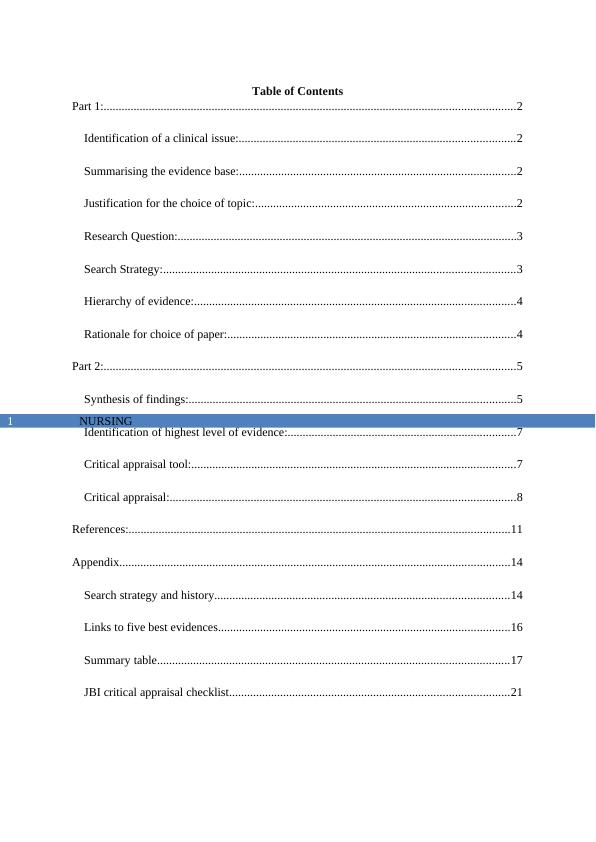
NURSING2
Part 1:
Identification of a clinical issue:
The Australian healthcare system is devoted to rendering effective healthcare services
so as to acquire positive health outcome. As mentioned by Mekonnen, Alhawassi,McLachlan
and Jo-anne (2018), the Australian healthcare system is ranked high in terms of the quality of
care services offered to the service users, however despite the advanced healthcare
infrastructure, medication error is one problem area that has not been efficiently resolved by
the Australian healthcare system. Pharmaceutical medicines/drugs are the first line of
pharmacological treatment intervention that are administered to patients to facilitate recovery
of the symptoms. However, medication administration within an intensive care unit is often
associated with high prevalence of medication error which compromises patient safety and
promotes poor health outcome.
Summarising the evidence base:
The evidence base reveals that medication error is a common problem that contributes
to a large percentage of mortality in Australia. Roughead et al. (2016), conducted a
systematic review of literatures and the overall findings of the research study suggested that a
total of 3% recurrent hospitalisations occur on account of medication errors. Research studies
further reveal that approximately 230,000 medication errors occur every year in Australia that
attributes to a cumulative expenditure of AU $ 1.2 billion (Tong et al., 2017).
Justification for the choice of topic:
The rationale for the choice of the topic can be mentioned as the poor health outcome
of the patients on account of medication administration error and increased healthcare
expenditure related to recurrent hospitalisations. Critical investigation of the evidence base
can help to identify the factors that trigger medication errors and identify appropriate
Part 1:
Identification of a clinical issue:
The Australian healthcare system is devoted to rendering effective healthcare services
so as to acquire positive health outcome. As mentioned by Mekonnen, Alhawassi,McLachlan
and Jo-anne (2018), the Australian healthcare system is ranked high in terms of the quality of
care services offered to the service users, however despite the advanced healthcare
infrastructure, medication error is one problem area that has not been efficiently resolved by
the Australian healthcare system. Pharmaceutical medicines/drugs are the first line of
pharmacological treatment intervention that are administered to patients to facilitate recovery
of the symptoms. However, medication administration within an intensive care unit is often
associated with high prevalence of medication error which compromises patient safety and
promotes poor health outcome.
Summarising the evidence base:
The evidence base reveals that medication error is a common problem that contributes
to a large percentage of mortality in Australia. Roughead et al. (2016), conducted a
systematic review of literatures and the overall findings of the research study suggested that a
total of 3% recurrent hospitalisations occur on account of medication errors. Research studies
further reveal that approximately 230,000 medication errors occur every year in Australia that
attributes to a cumulative expenditure of AU $ 1.2 billion (Tong et al., 2017).
Justification for the choice of topic:
The rationale for the choice of the topic can be mentioned as the poor health outcome
of the patients on account of medication administration error and increased healthcare
expenditure related to recurrent hospitalisations. Critical investigation of the evidence base
can help to identify the factors that trigger medication errors and identify appropriate
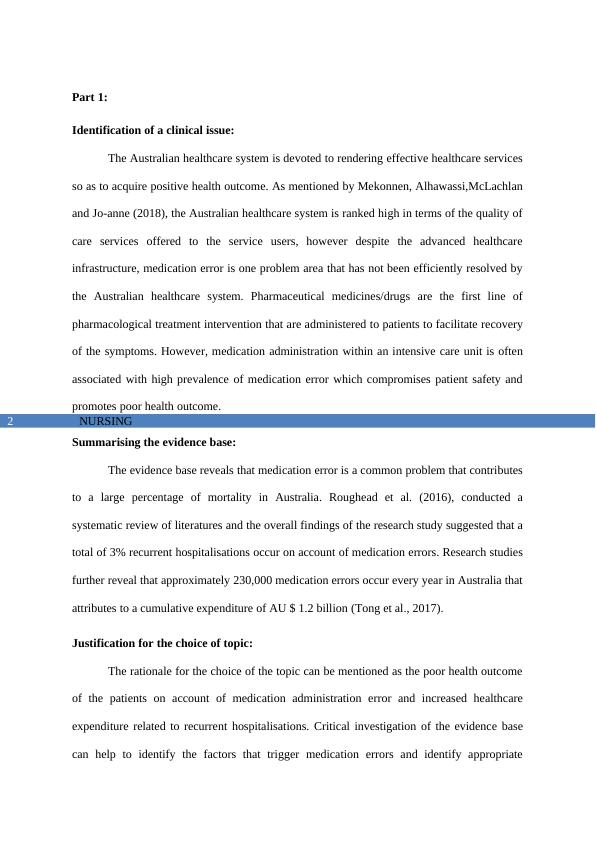
NURSING3
interventions that can help to avoid medication errors and promote improved healthcare
outcome.
Research Question:
On the basis of the retrieved background information, the research question for the
study can be formulated as follows:
What does the evidence base suggest about the interventions that can help to reduce
medication error within healthcare setting?
The research question can be further subdivided into the PICO format in order to
retrieve relevant scholarly journals that help to address the broad research question:
P: Population What are the evidence based interventions
that can be taken up by nursing
professionals to reduce medication error?
I: Intervention How effective are strategies such as
compliance with the 5 R’s of medication,
Tall Man lettering to differentiate between
LASA medications to improve holistic
patient outcome?
C: Comparison None
O: Outcome How effective are the medication error
prevention errors to promote increased
patient safety and reduce recurrent
hospitalization rate?
interventions that can help to avoid medication errors and promote improved healthcare
outcome.
Research Question:
On the basis of the retrieved background information, the research question for the
study can be formulated as follows:
What does the evidence base suggest about the interventions that can help to reduce
medication error within healthcare setting?
The research question can be further subdivided into the PICO format in order to
retrieve relevant scholarly journals that help to address the broad research question:
P: Population What are the evidence based interventions
that can be taken up by nursing
professionals to reduce medication error?
I: Intervention How effective are strategies such as
compliance with the 5 R’s of medication,
Tall Man lettering to differentiate between
LASA medications to improve holistic
patient outcome?
C: Comparison None
O: Outcome How effective are the medication error
prevention errors to promote increased
patient safety and reduce recurrent
hospitalization rate?
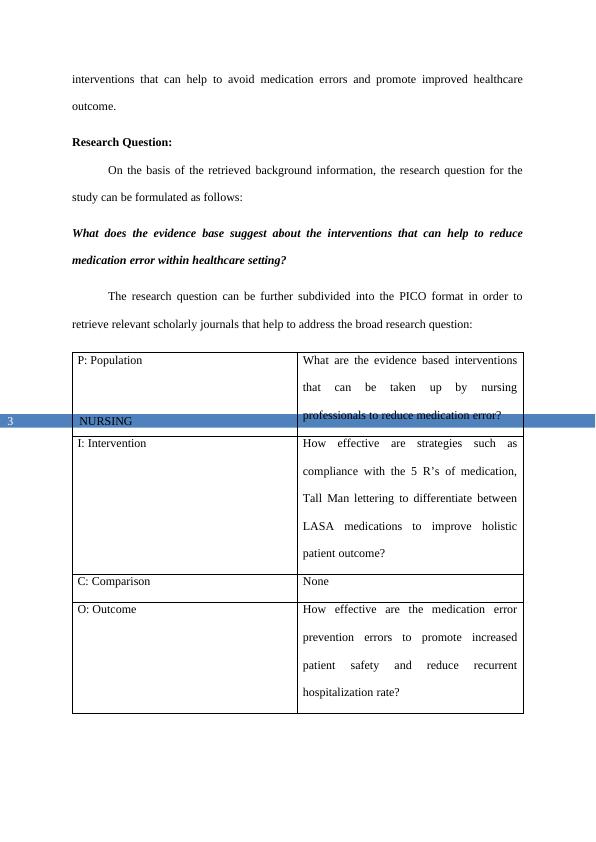
NURSING4
Search Strategy:
An exhaustive search was conducted on the electronic database of Google Scholar and
Medline (Proquest) using appropriate search terms such as: Medication error, interventions,
positive patient outcome and patient safety. Inclusion criteria was considered as consideration
of papers published between 2015 to 2019, papers published in English and papers that were
accessible for full-text. Exclusion criteria included papers that were published in foreign
languages other than English, papers that were not accessible for full text and papers that
were published before 2015.
Hierarchy of evidence:
1. Berdot, S., Roudot, M., Schramm, C., Katsahian, S., Durieux, P., & Sabatier, B.
(2016). Interventions to reduce nurses’ medication administration errors in inpatient
settings: a systematic review and meta-analysis. International Journal of Nursing
Studies, 53, 342-350. (Level1.b)
2. Hayes, C., Jackson, D., Davidson, P. M., & Power, T. (2015). Medication errors in
hospitals: a literature review of disruptions to nursing practice during medication
administration. Journal of clinical nursing, 24(21-22), 3063-3076. (Level1.b)
3. Durham, M. L., Suhayda, R., Normand, P., Jankiewicz, A., & Fogg, L. (2016).
Reducing medication administration errors in acute and critical care: multifaceted
pilot program targeting RN awareness and behaviours. JONA: The Journal of Nursing
Administration, 46(2), 75-81. (Level 3.e)
4. Cloete, L. (2015). Reducing medication errors in nursing practice. Cancer Nursing
Practice, 14(1). (Level4.a)
5. Gorgich, E. A. C., Barfroshan, S., Ghoreishi, G., & Yaghoobi, M. (2016).
Investigating the causes of medication errors and strategies to prevention of them
Search Strategy:
An exhaustive search was conducted on the electronic database of Google Scholar and
Medline (Proquest) using appropriate search terms such as: Medication error, interventions,
positive patient outcome and patient safety. Inclusion criteria was considered as consideration
of papers published between 2015 to 2019, papers published in English and papers that were
accessible for full-text. Exclusion criteria included papers that were published in foreign
languages other than English, papers that were not accessible for full text and papers that
were published before 2015.
Hierarchy of evidence:
1. Berdot, S., Roudot, M., Schramm, C., Katsahian, S., Durieux, P., & Sabatier, B.
(2016). Interventions to reduce nurses’ medication administration errors in inpatient
settings: a systematic review and meta-analysis. International Journal of Nursing
Studies, 53, 342-350. (Level1.b)
2. Hayes, C., Jackson, D., Davidson, P. M., & Power, T. (2015). Medication errors in
hospitals: a literature review of disruptions to nursing practice during medication
administration. Journal of clinical nursing, 24(21-22), 3063-3076. (Level1.b)
3. Durham, M. L., Suhayda, R., Normand, P., Jankiewicz, A., & Fogg, L. (2016).
Reducing medication administration errors in acute and critical care: multifaceted
pilot program targeting RN awareness and behaviours. JONA: The Journal of Nursing
Administration, 46(2), 75-81. (Level 3.e)
4. Cloete, L. (2015). Reducing medication errors in nursing practice. Cancer Nursing
Practice, 14(1). (Level4.a)
5. Gorgich, E. A. C., Barfroshan, S., Ghoreishi, G., & Yaghoobi, M. (2016).
Investigating the causes of medication errors and strategies to prevention of them
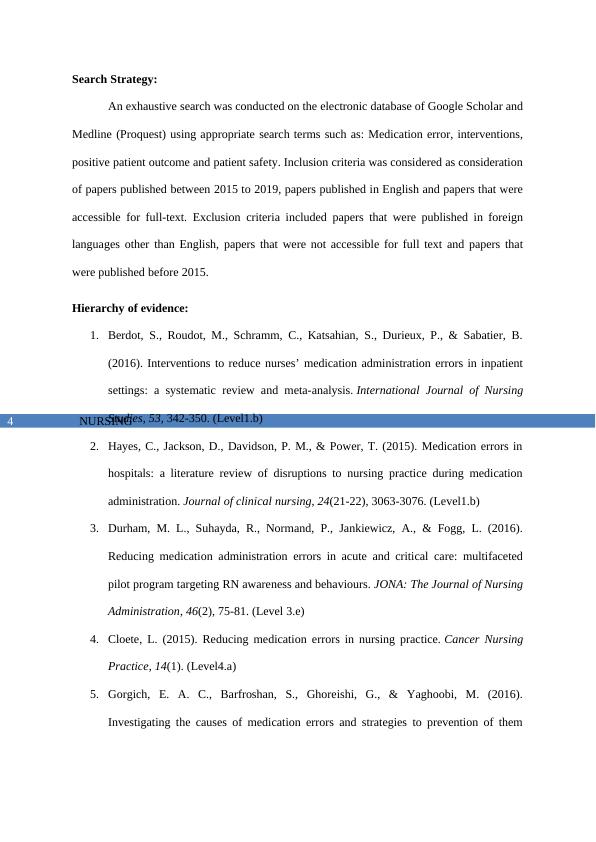
NURSING5
from nurses and nursing student viewpoint. Global journal of health science, 8(8),
220. (Level 4.b)
Rationale for choice of paper:
All the five articles focused on evidences for medication error and different strategies
and interventions that could be applied for reducing them. Of the five articles, two were
systematic reviews and had been selected since they comprised of a summary of information
collected from previously existing research, and were most likely to generate accurate and
reliable conclusions. One was an observational study that enabled observing the impacts of
interventions in natural setting, thus provided insight into the research phenomenon. A
literature review was also considered eligible since it comprised of contemporary knowledge,
together with substantive findings, in addition to theoretical contribution to the topic.
Selection of a cross-sectional study was based on the fact that it helped in proving
assumptions and comprised of numerous variables.
Part 2:
Synthesis of findings:
According to Gorgich, Barfroshan, Ghoreishi and Yaghoobi (2016) MAE is a serious
issue all across the world and directly threatens patient health and safety and might even lead
to death of patients. On conducting a cross-sectional descriptive study it was found tiredness
among healthcare professionals due to an increase in workload (97.8%) and drug calculation
amid nursing students (77.4%). The findings suggested that reducing work pressure by
augmenting healthcare personnel and establishing a medication calculation unit will help in
lowering risks of MAE. Durham, Suhayda, Normand, Jankiewicz and Fogg, (2016) argued
that sensitivity of registered nurse must be increased towards potential risk of medication
error, in order to decrease rates of observed medication errors (OME). Usage of process
from nurses and nursing student viewpoint. Global journal of health science, 8(8),
220. (Level 4.b)
Rationale for choice of paper:
All the five articles focused on evidences for medication error and different strategies
and interventions that could be applied for reducing them. Of the five articles, two were
systematic reviews and had been selected since they comprised of a summary of information
collected from previously existing research, and were most likely to generate accurate and
reliable conclusions. One was an observational study that enabled observing the impacts of
interventions in natural setting, thus provided insight into the research phenomenon. A
literature review was also considered eligible since it comprised of contemporary knowledge,
together with substantive findings, in addition to theoretical contribution to the topic.
Selection of a cross-sectional study was based on the fact that it helped in proving
assumptions and comprised of numerous variables.
Part 2:
Synthesis of findings:
According to Gorgich, Barfroshan, Ghoreishi and Yaghoobi (2016) MAE is a serious
issue all across the world and directly threatens patient health and safety and might even lead
to death of patients. On conducting a cross-sectional descriptive study it was found tiredness
among healthcare professionals due to an increase in workload (97.8%) and drug calculation
amid nursing students (77.4%). The findings suggested that reducing work pressure by
augmenting healthcare personnel and establishing a medication calculation unit will help in
lowering risks of MAE. Durham, Suhayda, Normand, Jankiewicz and Fogg, (2016) argued
that sensitivity of registered nurse must be increased towards potential risk of medication
error, in order to decrease rates of observed medication errors (OME). Usage of process
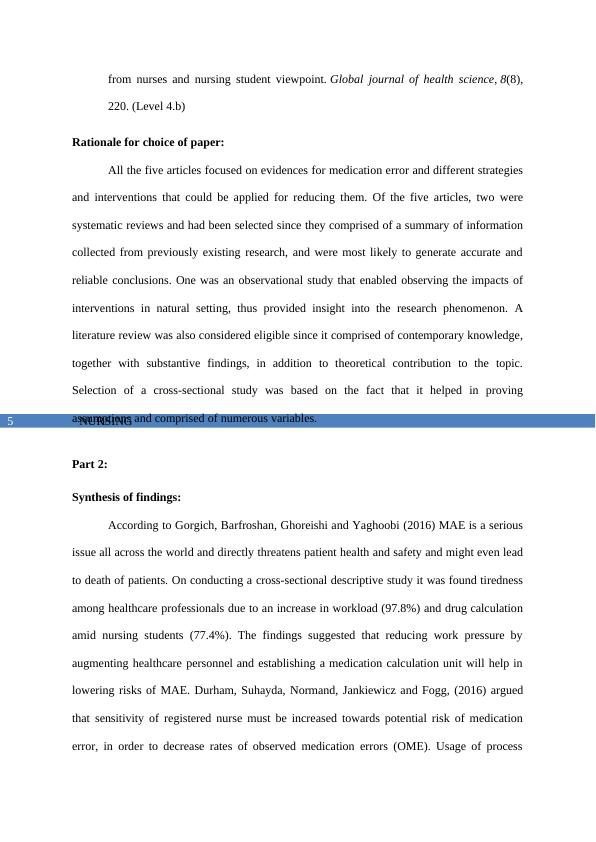
End of preview
Want to access all the pages? Upload your documents or become a member.
Related Documents
Evidence Based Nursing Report on Type 2 Diabetes Mellitus Managementlg...
|30
|5498
|291
Health & Social Care In The Community Docx.lg...
|9
|1919
|20
Evidence-Based Practice in Health Care: Reinforcing Safe Practicelg...
|16
|5251
|78
Best Evidence Based Practice for Positive Therapeutic Relationship with Culturally Diverse Patientslg...
|18
|4514
|79
Preventing Medication Errors: Utilizing Evidence-Based Practicelg...
|6
|1519
|80
Inquiry in Clinical Practice: Identification of Patient Safety Issues Concerned with Nursing Practiceslg...
|4
|545
|222
